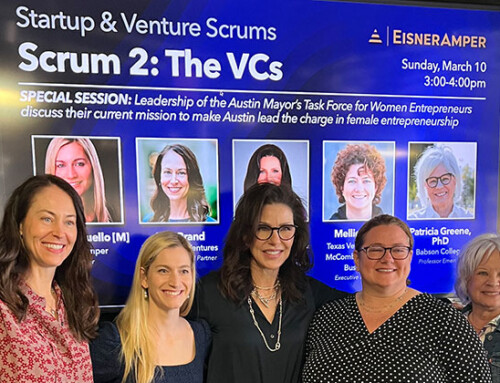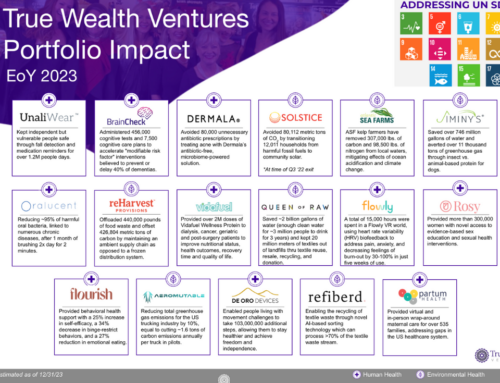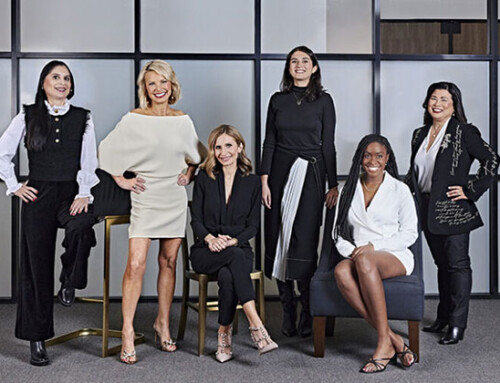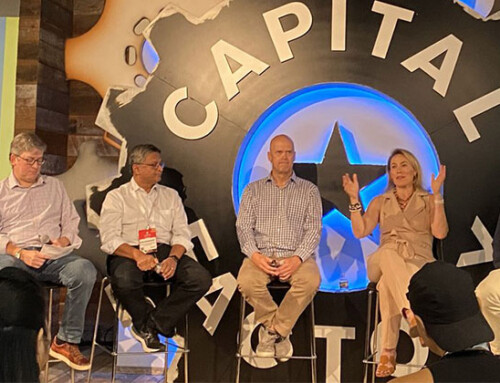What is True Wealth Ventures?
We are an early stage fund focused on women-led companies. We define women-led to mean at least one woman of significant decision-making authority or influence on the founding or executive team. We are two general partners, myself and Kerry Rupp, both based in Austin, Texas and we just closed $19.1 million dollars on our first fund.
Why did you launch True Wealth Ventures?
It had been because I had been in mechanical engineering, semiconductors, venture capital and beer, where it is male-dominated. I started doing my homework and saw these studies that show the financial outperformance of companies that have been able to get more women into leadership positions. I got very interested in why that was and how to move the needle. I realized I never met another woman in venture capital. These pieces started coming together and everything seemed very synergistic.
What is the fund’s current focus area?
We are focused in the market of sustainable consumer and consumer health. This is a financial thesis versus some feminist manifesto. The first part of the thesis is that there is a lot of data showing that when there are more women in leadership positions in companies, whether they are smaller venture-capital backed startups or large Fortune 500, publicly-traded companies, the companies perform significantly better financially. The second part is that women are making the vast majority of purchasing decisions in the markets in which we’re investing. They are making 85% of consumer purchasing decisions and 80% of all healthcare decisions. Women are making choices for themselves, their children, spouses, aging parents, etc. We think gender-diverse teams’ focus in these markets will have an additional financial advantage because they understand the customer-market need better, so they can design products to meet the need more effectively and go to market more efficiently.
True Wealth Ventures has announced two investments so far, UnaliWear and BrainCheck. Can you tell us about the process behind those two investments and your investment process in general?
In terms of deal flow, we have not been doing a lot of proactive deal sourcing other than traditional table stakes – judging business plan competitions, mentoring at co-working spaces – because we have been fundraising up until the end of January. We are currently really focused in Texas; however, we are planning to invest across the U.S. – 40% of our deal flow is within Texas. Texas is a fantastic state for badass women – we have very strong women in Texas.
We won a grant through the US EDA as part of their regional development strategy to seed funds in regions that were underdeveloped for venture capital. We applied with our region being women entrepreneurs. We were granted $250,000 to help market to women entrepreneurs and help launch the fund. We are finally turning our attention to proactively sourcing deals. Even without proactive sourcing, last year we saw 600 deals – 90% of which had a woman of significant decision-making influence, over 50% fit our market focus. We have hired two MBA venture fellows out of a fantastic program, that have been helping us sort through these deals and help with due diligence.
Given your experience, do you have any advice or guidance to colleagues that are still missing these blind spots?
I do not think it is men against women—it is culture against women. When women entrepreneurs are in front of both men and women investors they rate them the same. Investors need to realize there is a serious cultural bias going on. There is some great work out of Columbia Business School analyzing the TechCrunch pitch competitions, looking at the questions that investors ask women vs. men. They consistently ask men “promotion” questions and consistently ask women “protection” questions. This fundamental bias sets different expectations of the growth and risk potential. Being conscious of these issues as an investor, manager and colleague is critical. There is a lot of proactive work that we all need to do to level the playing field and get our fair share of the talent that’s out there.
In the corporate world, mandating that there’s a diverse slate of candidates applying for a job, pulling women up in the organization saying I want you to apply for this job, supporting women’s ideas and opinions in meetings are all ways to have an impact. It has beenshown that diversity, not just gender diversity, but ethnic, background, age, etc. really increases the quality of problem-solving and innovation. Especially when dealing with venture-backed investments, it is so critical. You are trying to optimize innovation in order to outperform financially. It is really worth being aware of and understanding how to be conscious of it and support more diverse teams.






